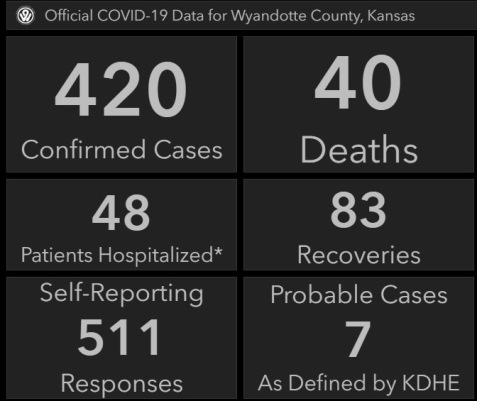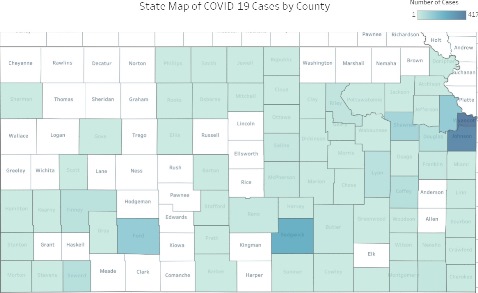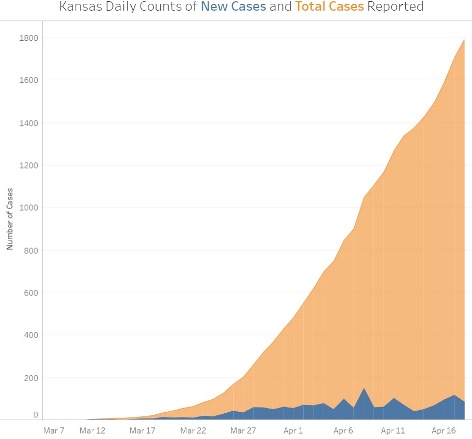In-person mass protests not a good idea, doctors say

Doctors at the University of Kansas Health System on Monday encouraged people to keep staying home, keep social distancing and practice good hygiene.
Testing will find out how many people have had the disease in the community, Dr. Steven Stites, chief medical officer at the KU Health System, said. Currently health experts are guessing that perhaps 80 to 95 percent of the people haven’t had it. Testing would give them a better idea of the number.
“The majority of people have not had the virus, so they’re still susceptible of getting it,” Dr. Stites said. “When you start opening up society, and don’t do shelter in place, what changes?”
What changes is people have more social contacts, go out, meet together, stop social distancing, and spread the virus more, he said. Then they are back where they started, with hospitals being overwhelmed and more people dying.
“The virus is best mitigated by a strategy to test a lot of people,” he said.
Then they find positive cases, find the people who were in contact with positive patients, and isolate those persons so they can’t infect others, he said.
“That’s why when we think about reopening society, we have to do it thoughtfully and logically,” he said.
Dr. Dana Hawkinson, medical director of infection prevention and control at KU Health System, said if not done in a thoughtful manner, there could be exponential growth, with vulnerable populations getting it, and they would be back to where they started.
Dr. Stites said leaders and medical experts need to work together to determine a way of reopening society in a thoughtful manner.
Wyandotte County reported 420 positive cases and 40 deaths at 11 a.m. Monday, according to the Unified Government’s COVID-19 website.
The current barrier to testing, according to Dr. Hawkinson, is a shortage of the type of biologic swabs that are needed. Lab capacity for testing in the state also could be a barrier.
The University of Kansas Health System reported that the number of positive COVID-19 patients on Monday at the hospital had decreased, compared to Friday’s numbers.
On Friday, there were 36 positive patients there, with 15 in the intensive care unit. On Monday, the hospital reported 24 inpatients, with 11 in the ICU, according to Dr. Hawkinson. They are monitoring another 13 patients for COVID-19. Overall, 59 recovering COVID-19 patients have been discharged from KU Health System.
Dr. Damien Stevens, a pulmonary and critical care physician at the KU Health System, recently returned from New York, where he was a week on the front lines helping other doctors care for an overwhelming number of patients. He is currently self-quarantining at home.
Dr. Stevens said at a KU Health System news conference today that outside, New York looked like a ghost town, while inside the hospitals, it was overwhelming, the front lobby was packed and several other areas were packed.
He worked at a 400-bed hospital where 80 to 90 percent of the patients were COVID-19 related, he said. About 100 were on ventilators, while only half of those were in the ICU, he said. Rooms were converted in other areas of the hospital to take care of the COVID-19 patients, he said.
The hospitals had a great need for nurses and respiratory therapists, he said. The usual ratio is 2-to-1 or 1-to-1 patients to nurses in the ICU, but often, the ratio during this crisis was 8-to-1, he said. There was a patient-to-nurse ratio on the floor of about 10-to-1, he said. The nurses were working 12-hour shifts.
With other hospitals awaiting a surge, some did not want to accept transfers from other hospitals, he said. It was difficult to triage and coordinate with different cities and different health systems, across a large area, he said.
It was sad to see patients who could say goodbye to their family members only through an iPad, as visitors were not allowed into the rooms, he said.
From a medical standpoint, there were a lot of patients in a medical drug trial, and they will be able to learn from it later, he said.
Dr. Hawkinson said although the health system here has not been overwhelmed like New York, they have been close to a shortage in medications that ease the pain for patients on ventilators.
Dr. Hawkinson said testing is important in reopening society. KU Health System is relying on a test that will identify active positive cases, and keep those households self-quarantined to stop further infections.
There are questions currently about serology, or antibody testing, he said. These tests will show how much the virus has already affected the region. Some of the questions currently about these tests are if they are effective, and if there is enough testing material, he said.
There are questions about whether the tests are specific enough for this COVID-19 infection as compared to another coronavirus infection, he said. There also are questions about whether people can get coronavirus again, he said. There are no absolute answers to that at this time.
Dr. Stites said COVID-19 has spread through large groups, including meatpacking plants, nursing homes and churches, places that have close contact.
If the disease quickly runs through a nursing home where people are close together, it could just as easily run quickly through a meatpacking plant where people are close together, Dr. Hawkinson said.
“That will really cause a problem if we don’t open up in a slow, thoughtful manner,” he said. They don’t want the supply chain to be held back because of a lack of people to work there.
Dr. Stites said some of the models now show that this area was reaching its peak on April 19, but other models still showed a later date.
Doctors have serious reservations about large public gatherings to protest the stay-at-home orders. There have been reports of some protests planned in the Greater Kansas City area.
Dr. Stites said the problem with large public gatherings is people are probably not six feet away from each other, and they probably won’t do the other things necessary, such as use hand sanitizer and cough into their sleeves.
It didn’t work in meatpacking plants, nursing homes and churches where people were close together, he said.
“Here’s the overwhelming evidence: If you’re going to stay safe, you can’t stay in a crowd,” he said. “Can you think of a worse way to make your point than to watch a lot of people get infected?”
Dr. Stites said everyone wants to reopen society. If people want to protest, they might protest to help them get tests, but they shouldn’t protest in a mass gathering, according to Dr. Stites.
“Help us call attention to the need for taking care of people the right way, so we don’t end up with a 8-to 10-to-1 nursing ratio,” he said. “That should scare you.”
Dr. Hawkinson said chances are, if a person is close to a lot of other people in a crowd, the virus will probably land on some of those people. The novel coronavirus can be spread by coughing and sneezing, and also by breathing around others.
Some people do not show symptoms while they have the virus in its early days, according to Dr. Stites.
“The more premature that we open, the more patients will die,” Dr. Stevens said.
To view the KU doctors’ news conference, visit https://www.facebook.com/kuhospital/videos/364647944440238/.
The UG’s COVID-19 webpage is athttps://alpha.wycokck.org/Coronavirus-COVID-19-Information.
The Kansas COVID-19 resource page is at https://govstatus.egov.com/coronavirus.


